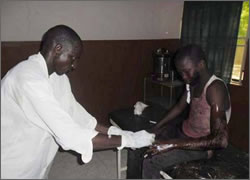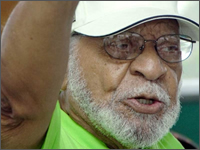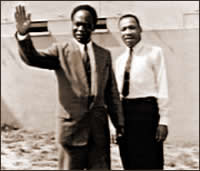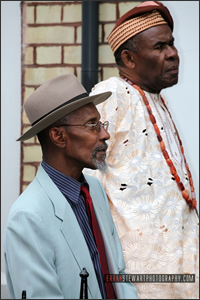Situated in the historic centre of Salvador, Pelourinho, recognised as UNESCO World Heritage site because of the Portuguese colonial architecture, Nigeria Cultural House was opened by the Nigerian Minister of Tourism, Culture and National Orientation.
In his statement, the Minister, Prince Adetokumbo Kayode, reaffirmed the common ancestry and cultural affinity between the people of Bahia and Nigeria and expressed gratitude to the Government and people of Bahia for donating a property in the historical site in Salvador. The Minister also mentioned that the opening of the house offers an opportunity to “join hands together to fight racial prejudice in all its manifestations”.
After Nigeria, Brazil has the largest concentration of African people in the world and majority is in the State of Bahia, with its capital, Salvador da Bahia.
Salvador, the third largest city of Brazil, is also the most African-centred of all Brazilian cities. The music, dance, religion, cuisine and the general culture of Brazilians have deep roots in African culture, especially in the Yoruba culture of Nigeria. The key elements of the African-Brazilian religion, the Orisas derive from the Yoruba culture and it is no accident that leading groups in Brazilian music, such as Olodum, Ilê Aiyè bear Yoruba names. Indeed, you can hear people in candomblé, the Afro-Brazilian religion, sing and pray in Yoruba. The main pillars of culture in Bahia, such as Pierre Verger, a Frenchman and devotee of candomble, spent his life in studying the religion of the Yoruba and its transplantation to Bahia. The famous artist, Carybé, made wooden panels of the orisas that are now in the Afro-Brazilian Museum in Salvador. Much food in Bahia, whether acarajé or vatapá, has its origin and flavour from Nigeria.

Given the cultural and historical links between Nigeria and Brazil, especially with Bahia, some are surprised that such a Cultural Centre was not opened soon after Independence in 1960. Even more surprising is to read that the house had been donated by Bahia to Nigeria as far back as 1998 but Nigeria had not made any use of the premises; it appears that the State of Bahia had threatened almost on a yearly basis to retrieve the building. Much seems to have gone wrong here.
Angola, Benin and South Africa have cultural centres in Salvador. This has led to calls asking when are the other African countries, especially those from the Atlantic coast, where the whole historical links between Africa and Brazil started, also going to mark their presence in Bahia?
There is little doubt that the opening of the Casa da Nigeria will contribute enormously to strengthening the bonds between Africa and Brazil to the benefit of both.
Many believe the Government of the State of Bahia and the Nigerian Government must be congratulated for this important historic step which was long in coming to fruition.

In his statement, the Minister, Prince Adetokumbo Kayode, reaffirmed the common ancestry and cultural affinity between the people of Bahia and Nigeria and expressed gratitude to the Government and people of Bahia for donating a property in the historical site in Salvador. The Minister also mentioned that the opening of the house offers an opportunity to “join hands together to fight racial prejudice in all its manifestations”.
After Nigeria, Brazil has the largest concentration of African people in the world and majority is in the State of Bahia, with its capital, Salvador da Bahia.
Salvador, the third largest city of Brazil, is also the most African-centred of all Brazilian cities. The music, dance, religion, cuisine and the general culture of Brazilians have deep roots in African culture, especially in the Yoruba culture of Nigeria. The key elements of the African-Brazilian religion, the Orisas derive from the Yoruba culture and it is no accident that leading groups in Brazilian music, such as Olodum, Ilê Aiyè bear Yoruba names. Indeed, you can hear people in candomblé, the Afro-Brazilian religion, sing and pray in Yoruba. The main pillars of culture in Bahia, such as Pierre Verger, a Frenchman and devotee of candomble, spent his life in studying the religion of the Yoruba and its transplantation to Bahia. The famous artist, Carybé, made wooden panels of the orisas that are now in the Afro-Brazilian Museum in Salvador. Much food in Bahia, whether acarajé or vatapá, has its origin and flavour from Nigeria.

Pelourinho, Salvador da Bahia
Historic links through the Maafa
Given the cultural and historical links between Nigeria and Brazil, especially with Bahia, some are surprised that such a Cultural Centre was not opened soon after Independence in 1960. Even more surprising is to read that the house had been donated by Bahia to Nigeria as far back as 1998 but Nigeria had not made any use of the premises; it appears that the State of Bahia had threatened almost on a yearly basis to retrieve the building. Much seems to have gone wrong here. Angola, Benin and South Africa have cultural centres in Salvador. This has led to calls asking when are the other African countries, especially those from the Atlantic coast, where the whole historical links between Africa and Brazil started, also going to mark their presence in Bahia?
There is little doubt that the opening of the Casa da Nigeria will contribute enormously to strengthening the bonds between Africa and Brazil to the benefit of both.
Many believe the Government of the State of Bahia and the Nigerian Government must be congratulated for this important historic step which was long in coming to fruition.

Yoruba gods, Orisas in the Tororó Dyke, Salvador da Bahia
Speak Out!
Have you been to Brazil? Nigeria and Brazil share culture, language and common ancestral deities like Yomoja, Sango and Obatala, did you feel connected to Mama Africa whilst there?Click here to speak out and share your perspective on this article.
Salvador, the third largest city of Brazil, is also the most African-centred of all Brazilian cities. The music, dance, religion, cuisine and the general culture of Brazilians have deep roots in African culture
See Related:




Get involved and help change our world